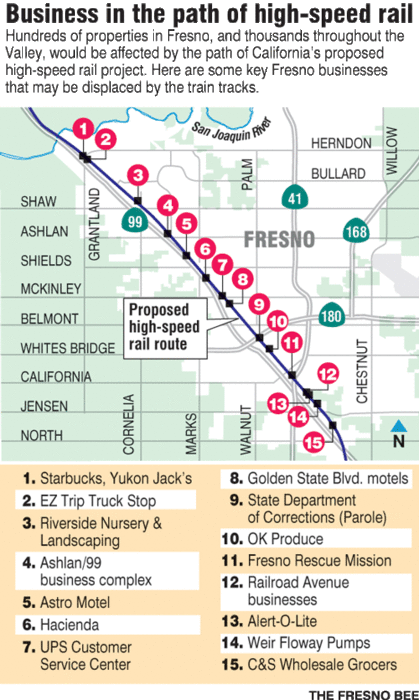U-T San Diego
The lowest-bidding partnership for the first segment of California’s high-speed rail line includes a firm with a history of cost overruns and costly lawsuits.
The California High-Speed Rail Authority on Friday announced that the American joint venture of Tutor Perini/Zachry/Parsons was the “best apparent value” with a low bid of $985 million – below the $1.09 billion bid by the next-lowest bidder.
On construction projects in California, the lowest bidder has a strong advantage in the eventual selection process. Rob Wilcox, a spokesman for the authority, declined to comment on bidders as the matter is finding its way to the authority’s board of directors.
“Five world-class teams competed for this opportunity, and the process is ongoing,” Wilcox said.
The first segment of the estimated $68 billion system is proposed to run 28 miles from Madera to Fresno in the San Joaquin Valley.
According to an August report by The Bay Citizen, sister site of California Watch, 11 major projects in the San Francisco Bay Area completed by Tutor in the last dozen years cost local governments $765 million more than they expected, or 40 percent above the initial bids.
A company spokesman did not return a message seeking comment. CEO Ron Tutor said in the August report that attacks against him were unfounded and overruns were caused by contracting agencies changing the projects in midstream.
At San Francisco International Airport, the city alleged in a 2002 lawsuit that the company purposely bid low to win a $626 million expansion contract, then charged $980 million for the job. Tutor said there wasn’t “a single fact” justifying the city’s position but eventually agreed to pay $19 million to settle.
The company’s list of projects includes an extension of Bay Area Rapid Transit to the San Francisco airport, the Alameda Corridor rail line and the San Diego Convention Center.
In 1993, the Port of San Diego paid the company $17 million to settle a $53 million lawsuit over the convention center project. In the lawsuit, the company blamed port-hired construction managers for delays that cost the company money.
Kevin Williams, a former San Francisco contracting officer who has testified in court against Tutor, said his experience with the company goes back decades.
“Tom Bradley, the late mayor of Los Angeles, said it best: Ron Tutor was the change-order artist, the king, and he’s proven himself to be just that,” Williams told U-T San Diego on Monday.
Williams said Tutor “is going to make up the difference somehow by lowballing. That is as old as history itself in the construction industry.”
Kevin Dayton, president and chief executive of Labor Issues Solutions and a critic of the bullet train project, said the rail authority is going to have to monitor change-order requests very closely.
“People are always accusing each other in the construction industry of pulling the change-order racket: winning the low bid and then piling up costs afterward,” said Dayton, a former lobbyist for Associated Builders and Contractors Inc. “Sometimes, it is a matter of architectural errors, but everyone always blames everybody else for it, saying, ‘The drawings were bad; the engineering was bad, et cetera.’ ”
Dayton also questioned whether the four losing teams – who are eligible to be paid a $2 million stipend to cover their costs for seeking the contract – might now be required to sign statements agreeing not to publicly challenge the process.
The next-lowest bidder was Dragados/Samsung/Pulice. Officials there could not be reached for comment.
In a statement posted on its website before the announcement, the team said with a combined value of $8 billion in executed design-build projects in the last five years, it offers the authority and building communities “a proven successful record of compliance, execution and on time delivery of complex infrastructure projects all over the world.”
Five teams submitted proposals to design and build the first segment. The proposals were evaluated and ranked based 70 percent on cost and the remainder for technical merit. Officials said factors such as an understanding of the project, schedule capability, approach and safety were part of the technical scoring.
The lowest-bidding partnership – Tutor Perini Corp. of Sylmar, Zachry Construction Corp. of Texas and Parsons Corp. of Pasadena – received the highest overall score of 90.55 out of 100.
The trio received a perfect 70 percent for its price proposal and received the lowest score – 20.55 – for its technical proposal.
Rail officials say they expect to present a contract to their board of directors in the coming weeks. The agency’s cost estimate for the first segment was $1.2 billion to $1.8 billion.
If they are unable to award the contract to the best-value bidder, they may proceed with the next most highly ranked, officials said.
This story resulted from a partnership among California news organizations following the state's high-speed rail program, including The Fresno Bee, The Sacramento Bee, California Watch, The Bakersfield Californian, The Orange County Register, the San Francisco Chronicle, The (Riverside) Press-Enterprise, U-T San Diego, KQED, the Merced Sun-Star, The Tribune of San Luis Obispo and The Modesto Bee.
(From California Watch.org)
In an empty agricultural Central Valley the corrupt Bullet Train plows through the most expensive and heavily populated areas.






No comments:
Post a Comment